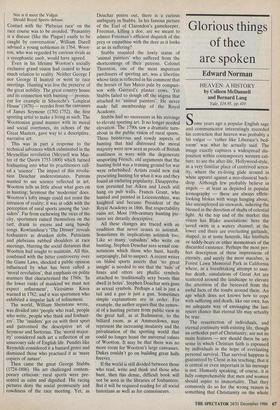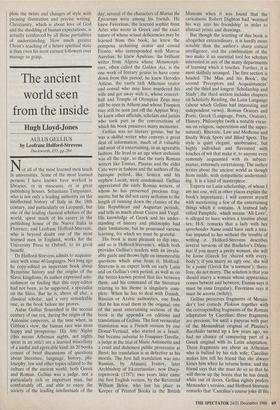Glorious things of thee are spoken
Edward Norman
HEAVEN: A HISTORY by Colleen McDannell and Bernard Lang Yale, £16.95, pp.410 Some years ago a popular English sage and communicator interestingly recorded his conviction that heaven was probably a bit vulgar — 'rather like Liberace's bed- room' was what he actually said. The image exactly captures a widespread dis- position within contemporary western cul- ture: to see the after-life, Hollywood-style, as a very familiar place of contrived seren- ity, where the ex-living glide around in white apparel against a neo-classical back- drop. Although few probably believe in angels — at least as depicted in popular iconography — there are always effete- looking blokes with wings hanging about, like unemployed air-stewards, ushering the blessed in the direction of shafts of celestial light. At the top end of the market this vision has Blake associations: here the saved swim in a watery channel; at the lower end there are everlasting garlands, shaped, as at some funerals, like footballs or teddy-bears or other mementoes of the discarded existence. Perhaps the most per- fect description of these impressions of eternity, and surely the most macabre, is Forest Lawn Memorial Park in California where, in a breathtaking attempt to sani- tise death, simulations of Great Art are scattered around the landscape to elevate the attention of the bereaved from the awful facts of the tombs around them. An age which does not known how to cope with suffering and death, like our own, has no adequate way of envisaging the last- resort chance that eternal life may actually be true.
The resurrection of individuals, and eternal continuity with existing life, though an orthodox part of Christianity, are not its main features — nor should there be any sense in which Christian faith is espoused by individuals in the hope of everlasting personal survival. That survival happens is guaranteed by Christ in his teaching; that it is central or even important in his message is not. Humanly speaking, of course, it is fully comprehensible that men and women should aspire to immortality. That they commonly do so for the wrong reason is something that Christianity on the whole tends to be rather discreet about. By the time of Christ, the Jewish religion (of which Christianity is a reformed version) had anyway got itself into several difficul- ties about the after-life. Some teachers denied personal resurrection, others up- held it. The exponents of the notion tended to envisage survival as a kind of compensa- tion for visible deprivations in the present life, and preached up individual survival as a victor ludorum might gloat in successful conquest of the field. The worldly and successful are overthrown, the meek come into their own, and those with nothing inherit the richness of eternal rewards.
The story of Dives and Lazarus, related by Christ himself, has echoes of this way of thinking: but they are only echoes, for Christ actually transformed Jewish under- standings of eternity. Instead of a future society in some specific location — and perhaps even on a purified planet — Jesus represented resurrection as a spiritual state in which the preoccupations and expecta- tions of the present existence fall away. Eternal life, he taught, was not social, nor was it a sort of sectarian triumph of those bullied by the school rotters on earth. It was, indeed, a place where there was neither marriage nor giving in mar- riage, where family life has dissolved away, and where the rewa,rd of the righteous is the eternal enjoyment of union with God. We are never told how 'the righteous', in this sense; are constituted, though some very explicit guidelines are offered which point to the narrow way that leads to perfection. What is always clear, however, is that eternal salvation has to do with belief, with exact truth, and with right conduct as creating the spiritual culture in which these may be known and assimilated into the understanding of the individual aspirant to faith.
Many contemporary Christians had bet- ter look out here: this is an age when even the most distinguished luminaries of Christianity are liable to be more excited about social or political or ethical rectitude than they are about religious doctrine or precise dogma. The age is impatient — at least when it comes to religion — of what the senior clergy are forever discounting as individualist spirituality.
Now in their illuminating study of Heaven, Colleen McDannell and Bernard Lang provide us not with a picture of the eternal synod chamber in the sky — for who can know what that would look like? — but with the different visions of the after-life which Christians have promoted down the ages. It is a fascinating and predictable account of relativities. Each generation and each culture, and even each social class, has tended to project eternity as an extension of its own priorities. There is not a great deal of Christ's original fabric: the heavenly mansion has usually been assembled with wistful earthly mate- rials, and is rather a pathetic shelter for the insecurities of human society. The book plots the twists and changes of style with pleasing illustration and precise writing. Christianity, which is about love of God and the shedding of human expectations, is actually reinforced by all these partialities of understanding. How much greater Christ's teaching of a future spiritual state is than even his most earnest followers ever manage to grasp.












































































































 Previous page
Previous page